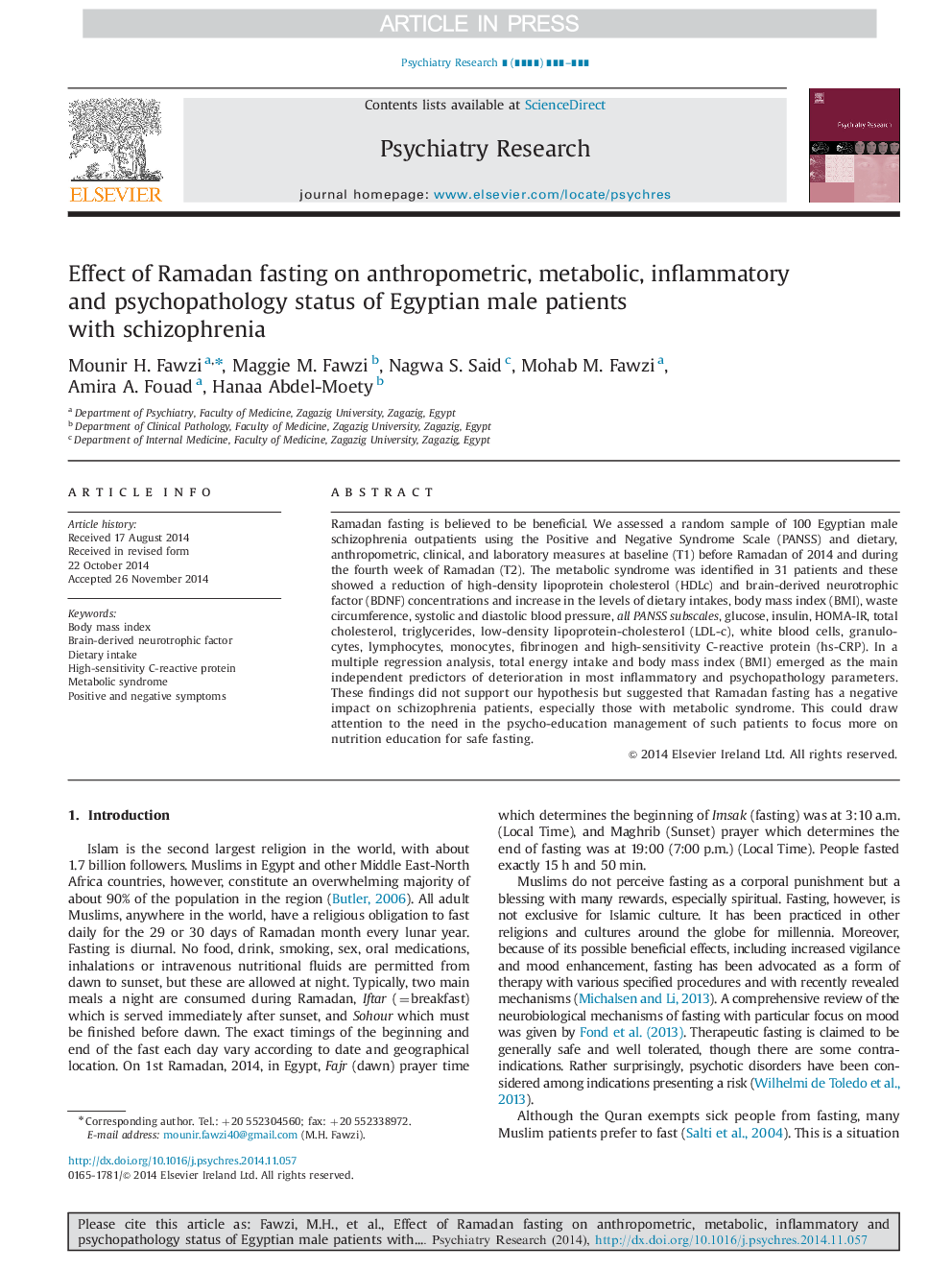| کد مقاله | کد نشریه | سال انتشار | مقاله انگلیسی | نسخه تمام متن |
|---|---|---|---|---|
| 10304152 | 545664 | 2015 | 8 صفحه PDF | دانلود رایگان |
عنوان انگلیسی مقاله ISI
Effect of Ramadan fasting on anthropometric, metabolic, inflammatory and psychopathology status of Egyptian male patients with schizophrenia
ترجمه فارسی عنوان
تأثیر روزهداری ماه رمضان بر وضعیت تن سنجی، متابولیکی، التهابی و روانپزشکی بیماران مرد مصری با اسکیزوفرنیا
دانلود مقاله + سفارش ترجمه
دانلود مقاله ISI انگلیسی
رایگان برای ایرانیان
کلمات کلیدی
شاخص توده بدن، فاکتور نوروتروفیک حاصل از مغز، مصرف غذا، پروتئین واکنش پذیر با حساسیت بالا، سندرم متابولیک، علائم مثبت و منفی،
موضوعات مرتبط
علوم زیستی و بیوفناوری
علم عصب شناسی
روانپزشکی بیولوژیکی
چکیده انگلیسی
Ramadan fasting is believed to be beneficial. We assessed a random sample of 100 Egyptian male schizophrenia outpatients using the Positive and Negative Syndrome Scale (PANSS) and dietary, anthropometric, clinical, and laboratory measures at baseline (T1) before Ramadan of 2014 and during the fourth week of Ramadan (T2). The metabolic syndrome was identified in 31 patients and these showed a reduction of high-density lipoprotein cholesterol (HDLc) and brain-derived neurotrophic factor (BDNF) concentrations and increase in the levels of dietary intakes, body mass index (BMI), waste circumference, systolic and diastolic blood pressure, all PANSS subscales, glucose, insulin, HOMA-IR, total cholesterol, triglycerides, low-density lipoprotein-cholesterol (LDL-c), white blood cells, granulocytes, lymphocytes, monocytes, fibrinogen and high-sensitivity C-reactive protein (hs-CRP). In a multiple regression analysis, total energy intake and body mass index (BMI) emerged as the main independent predictors of deterioration in most inflammatory and psychopathology parameters. These findings did not support our hypothesis but suggested that Ramadan fasting has a negative impact on schizophrenia patients, especially those with metabolic syndrome. This could draw attention to the need in the psycho-education management of such patients to focus more on nutrition education for safe fasting.
ناشر
Database: Elsevier - ScienceDirect (ساینس دایرکت)
Journal: Psychiatry Research - Volume 225, Issue 3, 28 February 2015, Pages 501-508
Journal: Psychiatry Research - Volume 225, Issue 3, 28 February 2015, Pages 501-508
نویسندگان
Mounir H. Fawzi, Maggie M. Fawzi, Nagwa S. Said, Mohab M. Fawzi, Amira A. Fouad, Hanaa Abdel-Moety,
